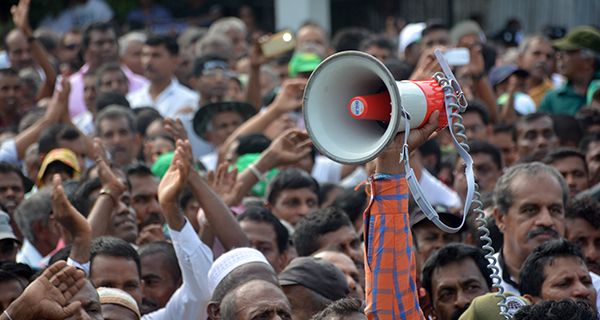The world civil rights movement as well as the Sri Lankan civil rights movement has a long history. According to Prof. Jayadeva Uyangoda, the non-alcoholic movement of 1912-1915 is said to be the oldest civilian movement in Sri Lanka. This was followed by the trade union movement, the post-1971 civil rights movement, the Movement for Justice and Peace (MIRJE), the Organization for the Protection of Democratic Rights (MDDR), the Land Agrarian Reform Movement (MOL) by MON Platform (PFF) The National Movement for a Just Society (NMSJ) is one such important civic movement.
Activities for civil and political rights and socio-economic and cultural rights, as well as for environmental rights including agro-fisheries, as well as death organizations, rural development, women, youth and credit societies based on various livelihoods based in rural and semi-urban areas. There are a significant number of civil society organizations operating throughout Sri Lanka, including friendly partnerships.
All of these fall into the category of NGOs as they operate outside the state structure. It is also reported that more than thirty five such NGOs with active civic activism are now registered with the government, which are not subject to any government authority, are not subject to any oversight of it, and have no other benefits, including finance, from any government structure. . Thus the number of organizations that have not yet been registered in any government structure may be even greater. The active population here may exceed one million.
These organizations should not be active in Sri Lanka. Was likely to decrease.
These civil society organizations are popular among the people because of the great dedication and enthusiasm of its activists in the past in the face of various challenges. It was this civic activism that brought new knowledge and cultures of the world to the people. In some cases, the political situation in the country has forced some civil society activists to pay with their lives.
Some activists representing the Fathers and Daughters of Missing Persons organization, which sought to send information on children missing during the 1988-89 riots to organizations such as the International Committee of the Red Cross and Amnesty International, were severely repressed by the then government. People like Matara and Chandradasa Ranasinghe went missing while obtaining information on several missing families in the Matara area, along with leaflets. Incumbent Prime Minister Mahinda Rajapaksa and Minister Vasudeva Nanayakkara took the report to the Geneva Human Rights Council. The then government had to ease its repression to relieve the pressure caused by the massive dissemination of that information internationally. As a result, a significant number of young people were spared death and some of them even held ministerial posts.
Even the most important and risky actions of this kind were carried out by the representatives of these civil society organizations. Heavy crackdowns were also launched on civilian groups that were initially monitoring the election. In some cases, they had to face physical infirmities due to assaults. These organizations had gained considerable public acclaim for their activities and sacrifices.
However, this situation was later changed consciously and deliberately by a group representing the government as well as the opposition who claimed to be patriots at the time. They wanted to shut the mouths of organizations that worked for democratic freedom, including peace, reconciliation, human rights and media freedom, to cripple their activism, to exclude them from society and to discredit the people.
To that end, large-scale malicious propaganda targeting such organizations was launched over the years with the support of some of the opposition political parties, including the Janatha Vimukthi Peramuna (JVP) and the government, as well as some private media outlets. It was reported that these activists were highly corrupt and had links with terrorist groups. But despite more than a decade of criticism, there are no reports of law enforcement or at least no investigation being launched into the allegations.
This unholy alliance was formed to attack the advocates of democratic rights such as peace and reconciliation, human rights and media freedom. Their activities were formally and unofficially intertwined. He carried out malicious and false propaganda by publishing photographs of some civil society leaders.
It received overwhelming support from a significant community in the country, and other civil society organizations that were not directly attacked gave their approval or support to the attackers in silence.
We are all now experiencing the results of this action that brought all of this together. Not only democratic rights, including human rights, but we have all fallen into an irreversible economic, social and political abyss.
All of these have contributed to the overnight destruction of the machinery established to secure our rights, which we have fought for for decades, to a lesser degree, by giving the people the mandate to pass the 20th Amendment by a two-thirds majority in Parliament.
They have supported the corrupt and criminals to work together to dismantle the investigations and prevention mechanisms on crime and corruption that are fundamental to a country’s development.
As a result, we are today in a state where not only human rights but also the basic necessities of life are at stake.
To overcome this situation, we must abandon the so-called patriotic Gongans and mobilize all these people for a program that will bring justice and equality to all nations living in the country. We must come to an accurate understanding of the extent of the precipice in which we have fallen, and find solutions to it ourselves. It will continue to stagnate in old ideologies and will no longer be able to do so through conventional activism.
For that, a strong civic activism based on policies has to be recreated in the country. In the midst of these dark clouds we have to look for silver lines for that.

